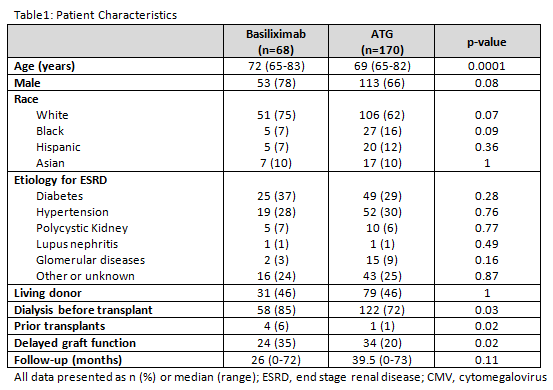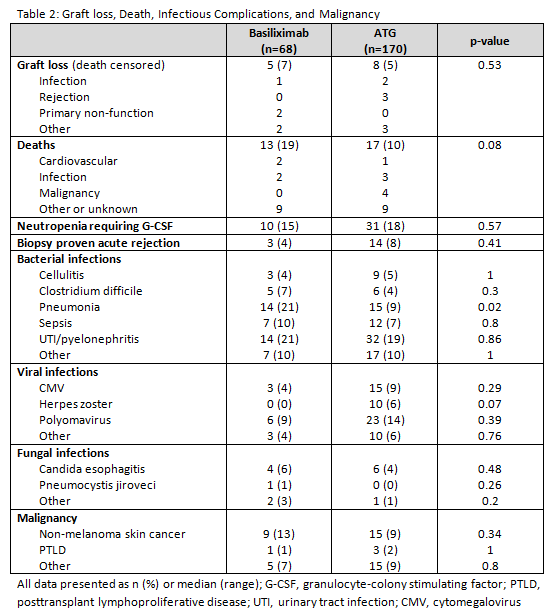Induction in the Elderly: A Comparison of Basiliximab versus Rabbit Anti-Thymocyte Globulin After Kidney Transplantation.
Weill Cornell Medical Center, New York, NY
Meeting: 2017 American Transplant Congress
Abstract number: B185
Keywords: Elderly patients, Induction therapy, Kidney transplantation
Session Information
Session Name: Poster Session B: Kidney Immunosuppression: Induction Therapy
Session Type: Poster Session
Date: Sunday, April 30, 2017
Session Time: 6:00pm-7:00pm
 Presentation Time: 6:00pm-7:00pm
Presentation Time: 6:00pm-7:00pm
Location: Hall D1
Background: Although it is well established that kidney transplant (KT) in the elderly is beneficial and safe, there is limited literature on the appropriate choice of induction agent in this population. Therefore, we wanted to determine if there were differences in outcomes between basiliximab and anti-thymocyte globulin (ATG) induction after KT following a steroid-sparing immunosuppression regimen in patients 65 years of age and older.
Methods: This study was a single-center, retrospective cohort study of all elderly patients who received a KT at our center between January 1, 2010 and December 31, 2015 who received either basiliximab or ATG. Patients were excluded if they received both agents as induction during their admission or were maintained on steroids after KT. The co-primary outcomes of this study were patient and graft survival. The secondary outcomes included incidence of acute rejection, infection, neutropenia, and malignancy.
Results: A total of 238 patients were included in the study of which 68 patients (29%) received basiliximab induction. More patients in the basiliximab group were older, dialysis dependent prior to transplant, had a history of prior transplants, and experienced delayed graft function. There was no statistical difference in graft loss and patient deaths between the two groups, p=0.53 and 0.08, respectively. Additionally, there was no difference in the incidence of acute rejection, neutropenia, and malignancy. Of the infections however, more patients in the basiliximab group developed pneumonia compared to patients in the ATG group.
 Conclusion: There were no significantly different outcomes in elderly KT recipients between the two induction strategies except for increased incidence of pneumonia in patients that received basiliximab.
Conclusion: There were no significantly different outcomes in elderly KT recipients between the two induction strategies except for increased incidence of pneumonia in patients that received basiliximab.
CITATION INFORMATION: Lee J, Liu E, Aull M, Kapur S. Induction in the Elderly: A Comparison of Basiliximab versus Rabbit Anti-Thymocyte Globulin After Kidney Transplantation. Am J Transplant. 2017;17 (suppl 3).
To cite this abstract in AMA style:
Lee J, Liu E, Aull M, Kapur S. Induction in the Elderly: A Comparison of Basiliximab versus Rabbit Anti-Thymocyte Globulin After Kidney Transplantation. [abstract]. Am J Transplant. 2017; 17 (suppl 3). https://atcmeetingabstracts.com/abstract/induction-in-the-elderly-a-comparison-of-basiliximab-versus-rabbit-anti-thymocyte-globulin-after-kidney-transplantation/. Accessed July 12, 2025.« Back to 2017 American Transplant Congress
